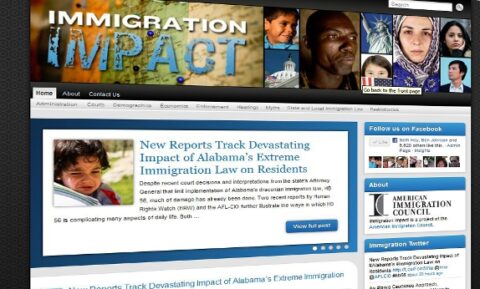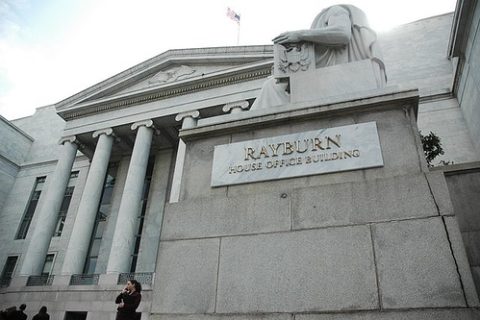Border Enforcement
Beyond A Border Solution
- Asylum
- May 3, 2023
America needs durable solutions. These concrete measures can bring orderliness to our border and modernize our overwhelmed asylum system. Read…
Read More
Immigration Impact’s Top 11 Blogs of 2011
A review of immigration issues for 2011 reads like a rollercoaster of American politics. Some state legislatures, for example—backed by restrictionists groups—attempted to pass harsh enforcement-only immigration laws. Some states succeeded; others struck down these bills; and a few even passed progressive immigration laws like tuition equity for undocumented students. At the federal level, Congress failed yet again to take major action on immigration, but allowed a few humanitarian and refugee issues to pass. The Obama administration deported a record high number of immigrants, but at the same time issued prosecutorial discretion guidelines in an attempt to prioritize enforcement efforts. While our top 11 blog posts—those most read, shared and commented on in the past year—couldn’t possibly tell the whole immigration story of 2011, the list does provides an interesting snapshot of what moved people and prompted reactions throughout the year. Read More

Immigration Impact’s Top 11 Blogs of 2011
A review of immigration issues for 2011 reads like a rollercoaster of American politics. Some state legislatures, for example—backed by restrictionists groups—attempted to pass harsh enforcement-only immigration laws. Some states succeeded; others struck down these bills; and a few even passed progressive immigration laws like tuition equity for undocumented students. At the federal level, Congress failed yet again to take major action on immigration, but allowed a few humanitarian and refugee issues to pass. The Obama administration deported a record high number of immigrants, but at the same time issued prosecutorial discretion guidelines in an attempt to prioritize enforcement efforts. While our top 11 blog posts—those most read, shared and commented on in the past year—couldn’t possibly tell the whole immigration story of 2011, the list does provides an interesting snapshot of what moved people and prompted reactions throughout the year. Read More

New Reports Track Devastating Impact of Alabama’s Extreme Immigration Law on Residents
Despite recent court decisions and interpretations from the state’s Attorney General that limit implementation of Alabama’s draconian immigration law, HB 56, much of damage has already been done. Two recent reports by Human Rights Watch (HRW) and the AFL-CIO further illustrate the ways in which HB 56 is complicating many aspects of daily life. Both organizations sent delegations to Alabama to interview a wide variety of Alabama residents and found that the fallout goes well beyond the official implementation of the law’s provisions and extends to personal relationships. Both found that the law is just one part of an agenda to deny people fundamental rights. Read More

As Iowa Caucuses Approach, Signatories of Iowa Compact Hope to Reframe Immigration Debate
Exhausted by the base immigration rhetoric prevalent in the GOP presidential debate, a group of concerned Iowans is seeking to reframe the issue in anticipation of the Iowa Caucuses next month. Last week, business, faith and city leaders in Iowa signed the Iowa Compact—a list of five principles meant to guide how people discuss immigration. Signatories of the compact, which is modeled after Utah and Indiana’s Compact, urged politicians “to stop playing politics on the issue” and said that state level fixes, like enforcement-only legislation, do “not address the root problem of immigration” but instead hurts economies and communities. Read More

Federal Verification System Won’t Help Alabama Determine Legal Status Under New Law
While the devastating impacts of Alabama’s over-the-top immigration law, HB 56, continues to be felt by Alabamans, there have been a recent string of victories. In addition to a federal judge’s ruling this week temporarily blocking state agencies from denying mobile home registrations to immigrants who cannot prove legal status, the state’s Attorney General also recently issued a memo limiting the scope of the law. It is becoming more and more evident that enforcing HB 56 is not as clear cut as its proponents thought it would be. Read More

DHS Shuts Down 287(g) Agreement with Maricopa County Following DOJ Investigation, Restricts Secure Communities
Today, the Secretary of the Department of Homeland Security (DHS), Janet Napolitano, announced that DHS will terminate its 287(g) agreement with the Maricopa County Sheriff’s Office and restrict access to the Secure Communities program, following damaging findings released by the Department of Justice (DOJ). After a three year long civil rights investigation into the Maricopa County Sheriff’s Office (MCSO)—an office led by America’s “toughest sheriff” Joe Arpaio—the DOJ announced today that it had “reasonable cause” to believe the Sheriff’s Office has “engaged in a pattern or practice of misconduct that violates the Constitution and federal law.” Read More

Federal Judge Blocks Yet Another Provision of Alabama’s Extreme Anti-Immigrant Law
As if people needed more proof that Alabama’s extreme anti-immigrant law, HB 56, is bad for the state, a federal judge temporarily blocked enforcement of yet another provision of the law this week. U.S. District Court Judge Myron Thompson temporarily enjoined enforcement of Section 30 that, as applied, requires mobile home owners to provide proof of lawful status before renewing their registration. Judge Thompson’s ruling, in which he calls Alabama’s law “discriminatorily based,” is the latest in a series of blows to the harsh law—a law that even Alabama’s own attorney general and governor find problematic. Read More

Supreme Court to Weigh in on Injunctions Against Arizona SB 1070
Earlier today, the Supreme Court announced what many supporters and opponents of Arizona SB 1070 long expected: that the Justices will themselves have the final word on the validity of the injunctions entered shortly after the law was enacted last year. Technically, the question before the Justices is simply whether four of the law’s provisions should be temporarily blocked pending resolution of a larger legal challenge. In addition, the Court will not consider claims raised in a separate lawsuit by numerous immigrants’ and civil rights groups. But in the decision it ultimately issues, the Supreme Court may well provide broad guidance about what role, if any, local police may play in enforcing federal immigration law—which could in turn affect legal challenges to copycat laws in other states, such as Alabama. Read More

New Report Challenges Notion that Harsh Enforcement Measures Drive Unauthorized Immigrants Out
Last week, a new report released by the Pew Hispanic Center found that nearly two-thirds of all unauthorized adult immigrants currently living in the U.S. (10.2 million) have been here for at least 10 years and nearly half of them (4.7 million) are parents of minor children. The longevity of their U.S. residency and pattern of parenthood suggest that these unauthorized immigrants are integrated into American society, challenging the notion that ramped-up enforcement measures like Arizona’s SB 1070 and Alabama’s HB 56 are effectively driving unauthorized immigrants back to their countries of origin. Read More

Alabama’s Immigration Law Digs Deeper Hole for State Economy
Although some Alabama lawmakers credit the state’s overall drop in unemployment to their new immigration law (HB 56), the reality is that many industries and sectors in the state are losing workers and jobs. This week, the Birmingham News reported that Alabama’s construction industry is losing jobs faster than nearly any other state—a loss experts say is due in part to HB 56’s draconian provisions. To make matters worse, Alabama’s crackdown on those who look or sound foreign (a Honda employee stopped this week and the arrest of a Mercedes executive last week) is causing many to fear Alabama’s anti-immigrant reputation will detract foreign investors from doing business in the state. In fact, according to the Tuscaloosa News, “the law is becoming the greatest threat to the state’s economy and job creation, overshadowing even the record-setting bankruptcy of Jefferson County.” Read More
Make a contribution
Make a direct impact on the lives of immigrants.

